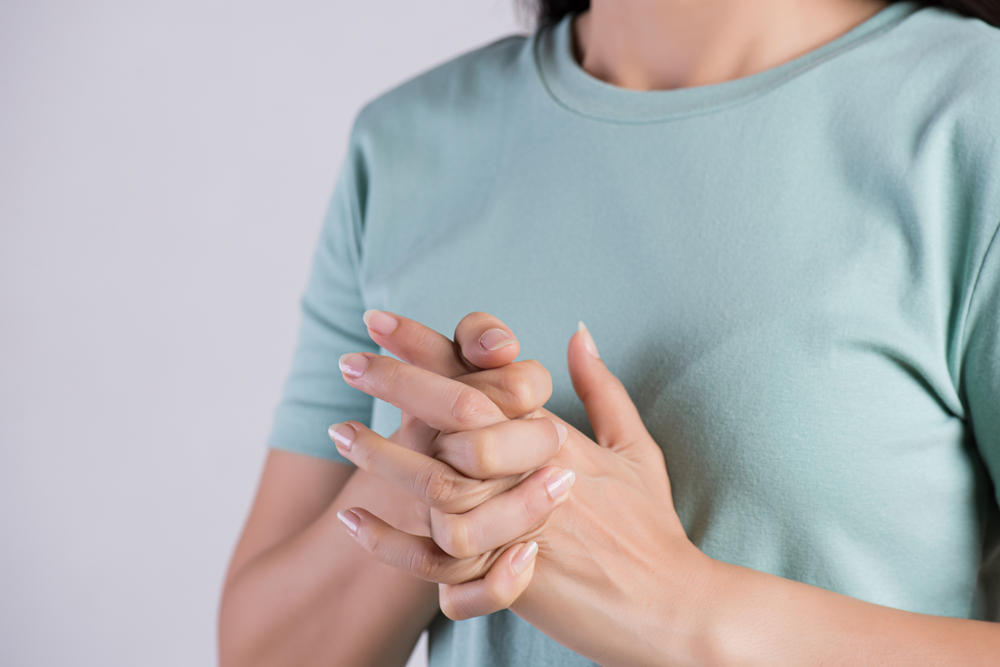Mythbuster: Cracking Your Knuckles Causes Arthritis

Although cracking your knuckles might irritate others around you, it is unlikely to increase your chance of developing arthritis. According to various research that examined the prevalence of hand arthritis in knuckle-cracking frequent users versus non-knuckle-cracking individuals.
A cracked knuckle makes a "pop" sound as bubbles in the fluid lubricate joints, synovial fluid, and rupture. When you extend or bend your fingers backwards to draw the bones apart, you'll create negative pressure that will cause the bubbles to burst. The authors of one research said that "the forces responsible for the destruction of hydraulic blades and ship propellers" are similar to the abrupt, vibratory energy released during knuckle cracking.
There are still compelling reasons to stop knuckle cracking even if it doesn't lead to arthritis. A reduction in grip strength may result from persistent knuckle cracking. Additionally, at least two accounts of injuries sustained while knuckle-cracking have been documented.
Reason for knuckle cracking:
According to studies, up to 54% of people clench their fingers. People do this for a variety of motives, such as:
- Sound: Some individuals like listening to the sound of knuckles cracking.
- The sensation: Some individuals believe that cracking their knuckles releases stress and enhances mobility by creating more space in the joint. Although it can seem like there is more space, there is no proof that this is the case.
- Nervousness: The same way that hand wringing or twisting your hair may help you busy your hands when you're feeling anxious, so can cracking your knuckles.
- Stress: Some stressed-out people need to vent their frustrations on something. Knuckle cracking could provide distraction and release without really doing any harm.
- Habit: It's simple to continue cracking your knuckles till it occurs without even realising it once you start doing so for any of these causes. It becomes a habit when you find yourself often cracking your knuckles without realising it.
The link between knuckle cracking and arthritis:
The joints that people could shatter the most frequently are their knuckles. One might accomplish this by:
a) Twisting their knuckles sideways, bending them backwards, or forward, and tugging on the bones surrounding the joint
b) While some people might worry that this leads to arthritis, numerous studies have found that this is unlikely to be the case.
One doctor looked into his knuckle-cracking after hearing concerns from his family. For 50 years, he broke his left hand's knuckles at least twice a day, but not his right.
The doctor noted that there were no changes between the two hands and that neither hand experienced the onset of arthritis. He concluded that arthritis and knuckle cracking was unrelated.
A 2011 research followed the onset of arthritis in 215 participants, 20% of whom engaged in frequent knuckle-cracking. Compared to the 21.5% of individuals who did not crack their knuckles, 18.1% of those in this group had hand arthritis. The researchers concluded that regardless of whether a person cracks their knuckles, the chance of developing arthritis is essentially the same.
Conflicting research:
There have been conflicting findings in research comparing knuckle crackers versus non-crackers. Knuckle cracking and hand arthritis are linked, according to a few studies. Others found no conclusive link.
So, can you resume cracking your knuckles? Well, it isn't advised. Even studies that did not link knuckle cracking to arthritis revealed additional symptoms of joint deterioration.
It shouldn't hurt, swell, or alter the contour of the joint to crack your knuckles. Whenever any of these occur, another issue is present. Even though it's difficult, you might potentially force your finger from the joint or harm the ligaments that surround the joint if you pull too hard.
If you experience discomfort or swelling in your joints when cracking your knuckles, an underlying ailment like gout or arthritis is probably at blame.
Trying to stop:
Here are some suggestions to help you quit the habit:
a) Consider the causes of your knuckle-cracking and deal with any underlying concerns.
b) Identify a different stress-relieving technique, like breathing exercises, exercise, or meditation.
c) Use alternative stress-relieving activities for your hands, including squeezing a stress ball or massaging a worry stone.
d) Become cognizant of every time you snap your fingers and force yourself to stop.
Conclusion:
Since there is no danger of cracking your knuckles, there should be no discomfort, swelling, or alteration of the joint's form. These are indicators that something is amiss, and your doctor should examine you. Your doctor should be seen if you crack your knuckles and feel discomfort or swelling in your joints. This might indicate an underlying medical disease. A sensation of relieving muscular tension and greater mobility may be brought on by the popping or cracking of joints because it activates nerve endings.
There is no proof that this type of joint manipulation leads to any health problems, such as arthritis. However, it may be wise to seek medical attention if a joint snaps, clicks, or fractures and there is nearby discomfort or swelling.






